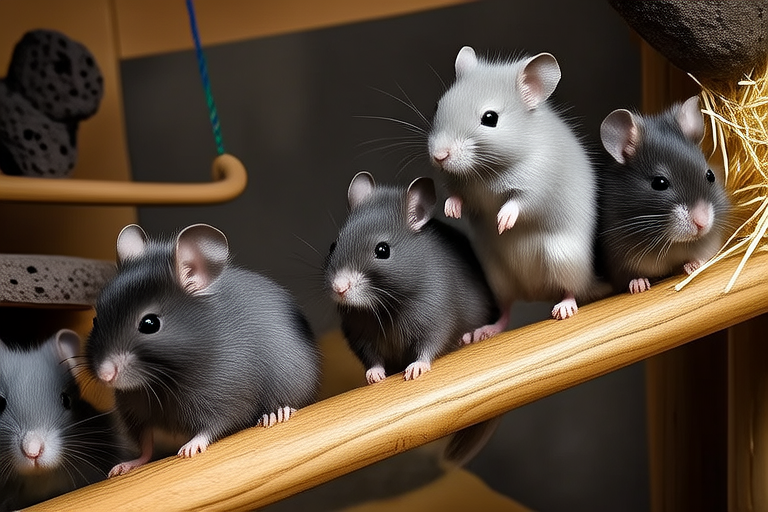Top 7 Myths About Chinchillas Debunked!
Chinchillas are charming, fluffy rodents that have captured the hearts of many animal lovers. However, like any popular pet, there are several myths surrounding these creatures that can lead to misunderstandings or even poor care practices. This article aims to debunk seven of the most common myths about chinchillas, offering scientific facts, expert opinions, and practical advice for both potential and current owners.
Myth 1: Chinchillas Are Easy Pets For Beginners
One of the most pervasive myths about chinchillas is that they make easy pets, especially for beginners. While their cuddly appearance may seem appealing, chinchillas actually require a significant amount of care and attention. They are sensitive animals with specific dietary needs and a unique grooming routine that includes dust baths.
According to Dr. Sarah Johnson, a veterinarian specializing in exotic pets, “Chinchillas need an environment that mimics their natural habitat as closely as possible. This includes a temperature-controlled room, since they can’t tolerate high humidity or temperatures above 80 degrees Fahrenheit.” She advises that beginners should thoroughly research the species before committing to ownership.
Tips for New Owners: Invest time in learning about chinchillas’ specific requirements. Join online forums and local groups to connect with experienced owners who can offer valuable advice and support.
Myth 2: Chinchillas Don’t Need Specialized Housing
Another misconception is that chinchillas can be housed in standard cages designed for other small animals, such as rabbits or guinea pigs. In reality, chinchillas need specialized housing to accommodate their climbing and jumping behaviors.
Dr. Emily Carter, an expert in small mammal care, explains, “Chinchillas are incredibly agile and need vertical space to climb. Their cages should be tall and wide enough to allow them to move freely without feeling cramped. Bars should be spaced no more than one inch apart to prevent injuries.”
Tips for Setting Up Housing: Purchase a cage specifically designed for chinchillas or modify a larger rabbit cage by adding shelves and ramps. Ensure the cage has a solid bottom for easy cleaning and that it’s placed in a quiet area away from direct sunlight.
Myth 3: Chinchillas Can Eat Any Kind Of Pellets
Many new owners believe that any kind of pellet will suffice for their chinchillas. However, this is far from true. Chinchillas have very specific dietary needs, and feeding them the wrong type of food can lead to serious health issues.
Dr. Michael Lee, a nutritionist specializing in small mammals, states, “Chinchillas require a diet rich in fiber, primarily hay. Pellets should be formulated specifically for chinchillas and should be fed sparingly to avoid obesity.” He emphasizes the importance of unlimited access to Timothy hay and fresh water.
Tips for Feeding: Always check the label to ensure the pellets are made specifically for chinchillas. Offer hay in a separate feeder to encourage chewing and dental health. Limit treats to small portions of fruits or vegetables once or twice a week.
Myth 4: Chinchillas Don’t Require Regular Vet Check-Ups
Some owners mistakenly think that because chinchillas are generally healthy and low-maintenance, they don’t need regular visits to the vet. However, chinchillas can suffer from various health issues, including dental problems, respiratory infections, and digestive disorders.
Dr. Karen Thompson, a small mammal specialist, notes, “Regular veterinary check-ups are essential for early detection of health problems. Chinchillas are prey animals and tend to hide signs of illness until they’re quite sick. A yearly examination can catch issues before they become critical.”
Tips for Veterinary Care: Find a vet experienced in treating small mammals. Schedule annual check-ups and be vigilant about changes in your chinchilla’s behavior or appetite.
Myth 5: Chinchillas Don’t Need Social Interaction
There’s a belief that chinchillas are solitary animals and don’t require social interaction. In truth, chinchillas are social creatures that thrive when housed in pairs or small groups.
Dr. Lisa Brown, a behavioral scientist, comments, “Chinchillas are naturally social and benefit from the companionship of another chinchilla. They enjoy interacting with each other, which helps reduce stress and promotes overall well-being.” She recommends housing chinchillas in pairs if space allows.
Tips for Socialization: If you plan to keep multiple chinchillas, introduce them gradually under supervision. Provide toys and activities that encourage interaction and play.
Myth 6: Chinchillas Can Be Handled Freely
A common myth is that chinchillas can be handled freely, similar to cats or dogs. However, chinchillas are delicate and can easily be injured if mishandled. They also have a tendency to bite when stressed or frightened.
Dr. Robert Jones, an animal behaviorist, warns, “Chinchillas are not meant to be held for extended periods. Their bones are fragile, and excessive handling can cause injury. It’s important to handle them gently and only when necessary.”
Tips for Handling: Sit on the floor or a low surface to avoid dropping the chinchilla. Support its body fully and never pick it up by the tail or ears. Allow it to get used to being handled gradually.
Myth 7: Chinchillas Don’t Need Regular Grooming
The final myth addressed in this article is that chinchillas don’t need regular grooming. On the contrary, chinchillas have extremely dense fur that requires regular maintenance to prevent matting and skin issues.
Dr. Patricia Davis, a dermatologist, explains, “Chinchillas clean themselves by taking dust baths. However, they sometimes need assistance, especially if they have long fur or are prone to matting. Regular brushing can help maintain their coat.”
Tips for Grooming: Provide a dust bath at least three times a week, but no longer than 15 minutes per session to prevent respiratory issues. Brush your chinchilla weekly with a soft brush to remove loose fur and prevent tangles.
In conclusion, while chinchillas may appear to be simple pets, they require careful consideration and proper care. By understanding and addressing these common myths, both new and experienced owners can provide their chinchillas with the best possible life. Remember, a well-informed owner is key to ensuring the health and happiness of these delightful creatures.
